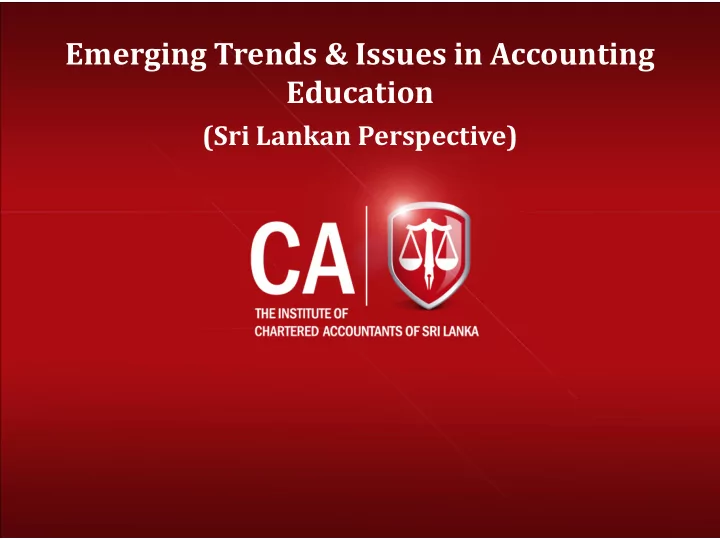

Emerging Trends & Issues in Accounting Education (Sri Lankan Perspective)
Background: Professional Accounting in Sri Lanka Professional Accounting Organizations (PAOs) in Sri Lanka PAO Student base Member base (Approx.) (Approx.) The Institute of Chartered Accountants of Sri Lanka 42,000 + 4,800 + The Association of Certified Chartered Accountants 4,500 + 400 + The Certified Management Accountants of Sri Lanka 12,000 + 2,300 + The Chartered Institute of Management Accountants 13,000 + 3,500 + The Association of Accounting Technicians of Sri Lanka 34,000 + 4,400 + Total 105,500 + 15, 400 + All the above PAOs are IFAC member bodies. The institute of Certified Public Accountants Sri Lanka qualification (recently launched) - not a IFAC member body.
Professional Accounting Organizations (PAOs) in Sri Lanka Student base Member base The Institute of The Institute of Chartered Accountants of Chartered Accountants Sri Lanka of Sri Lanka The Association of The Association of 12% Certified Chartered Certified Chartered 23% Accountants Accountants 31% 12% 40% The Association of The Association of Accounting Technicians Accounting Technicians of Sri Lanka of Sri Lanka 15% 3% The Certified The Certified 32% Management Management 4% 28% Accountants of Sri Lanka Accountants of Sri Lanka The Chartered Institute The Chartered Institute of Management of Management Accountants Accountants
Background: Professional Accounting in Sri Lanka Main Academic Institutions offering Accounting Specialization in Sri Lanka Number of state universities offering academic programs in 10 state universities accounting specialization Approximate annual intake for academic programs in 1,000 accounting specialization
Presentation flow IES compliance & implementation Qualification design for aspiring professional accountants Continuous professional development for professional accountants Technology disruptions introduction Knowledge delivery process Inherent trends to pursue academic & professional specialization in accounting Higher education framework in Sri Lanka
IES compliance & implementation Increasing awareness & trend to follow IFAC IESs by the Sri Lankan PAOs. Most curriculums have been recently revised to incorporate LO Creation of exit routes at different levels of the qualification Increased attention on outcome based approach Different levels of IES compliance and applications (in IPD and CPD) by different PAOs. As the IES outlines the principles, guidance needs to introduction be given to achieve consistency Different PAOs implementing different assessment standards leading to create varying level of testing ( sometimes the curriculum addresses the technical skill, however is either not tested or testing and a very basic level) Lack of awareness & lack of need for applying IESs by Academia ( universities)
Qualification design for aspiring professional accountants Capturing the increasing volume of knowledge into professional curricular ( ie IFRS / ISA’s / IT) Variation in capturing the relevant knowledge by different PAOs Impatient millennials want to be qualified members during a short time period (e.g. negative perception on average 6-7 years of time taken to become a fully-pledged CA) introduction Impatient millennials are attracted to Masters and Post Graduate programs with short program cycles Technology disruptions - Realigning the curricular to bridge the competency gaps and improving readiness to work in a highly sophisticated accounting & auditing environment which was geared through technology disruptions ( Uber – moving away from transaction processing)
Qualification designed for aspiring professional accountants Competencies required to exit from different levels of the qualification being different to the knowledge level and competencies required to proceed to the next level and proceed through the qualification ( issue with the different exit routes) Requirement for continuous updates to curricular based on the changing needs of the profession and new developments ( shortened life of the curriculum ) introduction Different skill requirements and competencies needed for other specialized fields such as ICT, banking, finance, etc. ( increasing in specialization) Language proficiency in English medium creating barriers in learning – time gap of transiting from National Languages to English medium learning
Continuous professional development of Professional Accountants Additional support and guidelines needed for members and member bodies to define the relevant CPD for members working across different fields and different layers of the profession Perception on CPD as a cost than an investment introduction Lack of a monitoring mechanism for mandatory compliance
Knowledge delivery process Increasing need for defining consistent standards for learning partners to uplift the knowledge delivery process of PAOs Different PAOs defining the learning partner accreditation scheme at their own discretion, creating differences in quality and standards of knowledge delivery Professional Accountant introduction Need for a common standard
Inherent trends in academic studies Undergraduate students from non-finance & accounting backgrounds discontinuing the professional exams until they complete the degree programs Traditional education system which does not expose or train students to case study based education at secondary education. Availability of several accounting undergraduate and postgraduate introduction programs Students following both academic and professional qualifications simultaneously leading to dropouts & low pass rates Students trying to do many programs at the same time ( undergraduate, CA, ACCA, CIMA)
Higher education framework in Sri Lanka Inability to align the professional qualifications with the Sri Lanka Qualification Framework creating recognition issues Contradictory views on academic equivalency of professional qualifications introduction
Thank you.
Recommend
More recommend